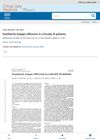SARS-CoV-2-Induced Telogen Effluvium: A Multicentric Study
November 2020
in “
Journal of the European Academy of Dermatology and Venereology
”

TLDR COVID-19 infection may cause significant hair loss, but full hair recovery is likely without special treatment.
In a study from March to August 2020 involving 214 patients diagnosed with acute telogen effluvium (ATE), researchers found that 191 patients (89.7%) had a confirmed prior SARS-CoV-2 infection. The average age was 47.4 years, with 78.5% being women. Most patients (86.4%) had experienced fever, and 12% had dermatologic symptoms. On average, hair shedding began 57.1 days after SARS-CoV-2 diagnosis, with 29.8% of patients scoring a 6 on the Sinclair Shedding Scale, indicating severe hair loss. The study concluded that SARS-CoV-2 infection is a risk factor for ATE, and patients with a history of the infection presenting with ATE should expect a prognosis similar to ATE induced by other infections, with a full recovery of hair likely without specific treatment.



